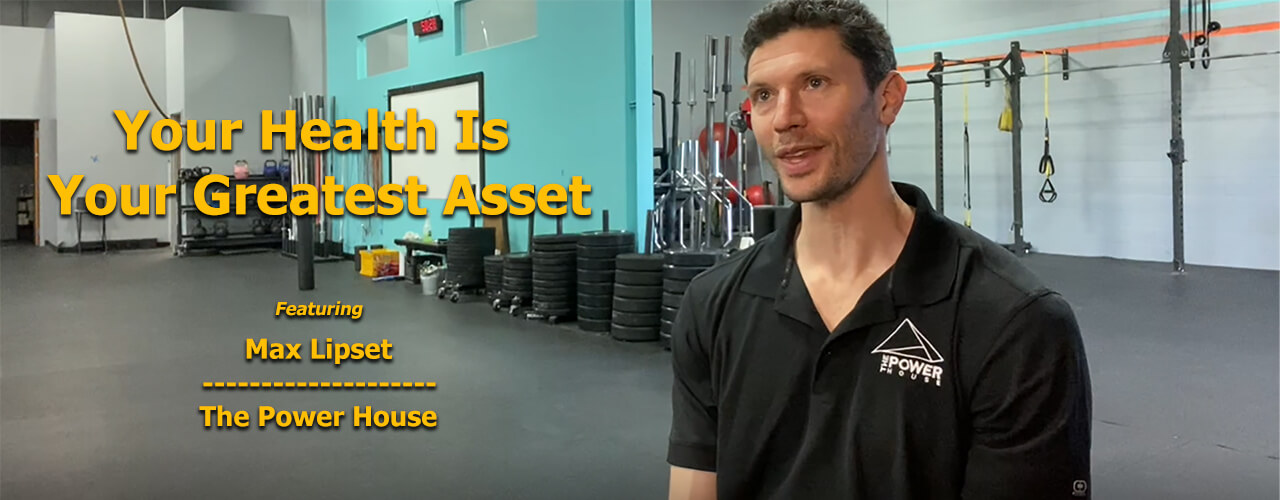Your Health is Your Greatest Asset
What follows is a summary of an interview I conducted with Allied Member and CEO and Founder of The Power House, Max Lipset. The Power House is a family-owned and family-run gym that provides fun and science-based fitness programs to help individuals and families become their healthiest and best selves.
Visit the Power House at https://tphmn.com/
This is part 1 of 3 in the series of interviews about the important role health plays in helping you be a more effective leader.
No matter what our net worth is or what we're focused on within our personal lives - our health is our greatest asset.
While there is so much we can't control right now, your health is something that you can manage and invest in like an asset.
People in positions of responsibility are making decisions right now that are affecting a lot of other people.
Whether recreating a daily routine - or - you are just trying to get back to what was working - it's crucial we continue to invest in our health as we navigate through crisis.
How can we move our health forward even when there's tons of adversity surrounding us?
Currently, we're getting flooded with information, and we're being told stay put in your house. So, what do we do with that? As leaders, we're out in the world, moving around, having meetings, and going from place to place.
We have an infrastructure in place to protect us against the rigors of our day-to-day lives. Now that infrastructure has been removed.
I want to remind people that when you're dealing with stressful information, it's essential to have a movement-based response. You get positive hormones from moving. Positive hormones will cancel out the negative ones that emanate from stress.
There’s this great book called, “Why zebras don't get ulcers,” and the whole premise of the book is, anytime there's a stress in the zebra’s world - like a lion - it responds by movement. I'm going to sprint. I'm going to run away. The zebra runs away from the lion, and then it goes right back to eating. It goes from a highly stressful state of being attacked, right back to a rest and digest states such as grazing and drinking water.
Having a movement-based response to stress is especially important when the stressor isn't creating movement like in the situation right now.
Five Specific Health Investment Strategies for Right Now.
1. Focus on Sleep Quality.
The quality and amount of sleep is so important. Your subconscious sorts a lot of things out for you while you're sleeping. We can't just think our way through situations. We have to do what our grandparents told us and sleep on it and allow ourselves to process information in that way.
2. Avoid Late-Night Food and Alcohol
Avoid food and alcohol for a fixed amount of time before you go to sleep. Two hours is usually enough time.
Why? Most digestion occurs while we sleep. When you go to sleep, the body will prioritize digesting food over the other processes that need to take place.
A lot of those (processes) are cognitive. When you sleep, your brain is being rinsed and cleansed of different cells that are byproducts of our day-to-day experiences.
If we're not getting good, quality sleep, it's like taking the garbage out to the curb, and then the garbage truck never comes.
You just keep taking the garbage out. Getting that good quality sleep - that's the garbage truck coming and taking the bags out and making sure that everybody can actually clean their nervous system.
One of the best things to facilitate that is making sure to avoid food and alcohol for a couple hours before you go to sleep.
The late-night snacking, the nightcap, give yourself a couple hours. Cut yourself off at a particular time, and that's going to really enhance the quality of your sleep.
Those processes that clean your nervous system can actually occur as opposed to your body just having to prioritize digesting food or getting rid of alcohol.
3. Get Moving
Move during the day so that when you hit the pillow at night you are fatigued and can actually go to and fall asleep more easily.
That's going to allow you to get better quality sleep. When you're physically tired, the mind will have a much easier time shutting off.
Make sure you're finding ways to get out and move. It's not necessarily the time to try to be a hero by taking on some super challenging, stressful, work out if you have a lot on your plate at work.
Make sure you get your heart rate up a little bit at some point throughout the day. Breaking a sweat is one of the best things you can do for your mental health.
4. Cut Yourself Off from Screens
Give yourself a specific time where you're just done. Whether that's thirty minutes or an hour before bedtime. If you're not in a routine of doing it, try starting with only 30 minutes before your targeted bedtime.
Make that hard screen-stop time decision earlier in the day. This way, you're not just letting bedtime be pushed back because you are tempted to start a new show or watch another piece of news.
5. Drop the Temperature
Sleeping in a colder room is another crucial thing for people.
Drop the temperature in your house around 65, as opposed to 67 to 70. Dropping the temperature a few degrees helps you stay asleep longer.
Our sleep is so vital to all the different processes that are happening to maintain our health.
Literally, every system in your body is improved by good quality sleep and impacted negatively by inadequate sleep. We want to make that a priority right now. Keeping immunity up and making good decisions - all is really driven by the quality and amount of sleep we get.


